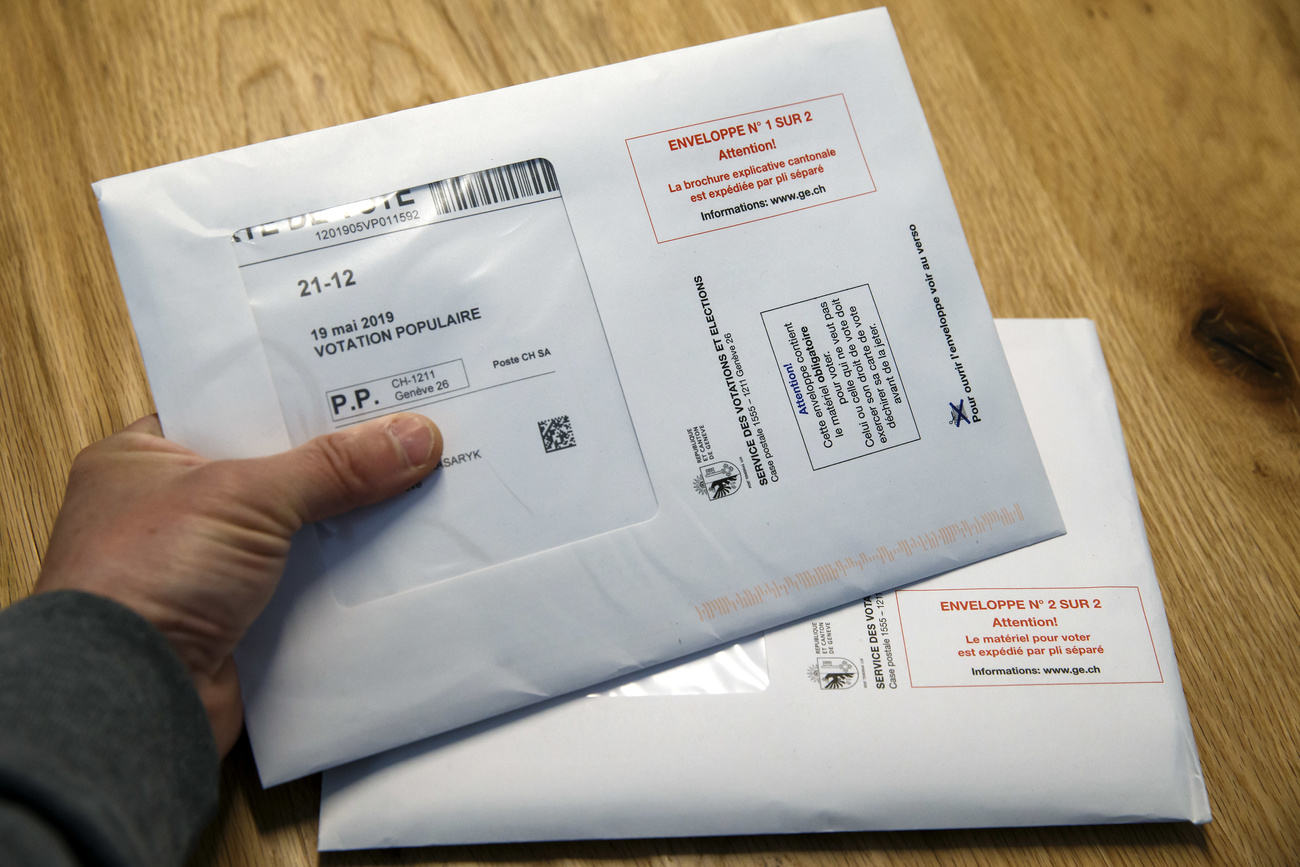How do you get the Swiss Abroad to the polls when there are none nearby?
Elections in Switzerland are so-called mobilisation elections – the main aim of the political parties is to get their potential voters to actually go to the polls and vote. But how does a Swiss party woo citizens who live abroad?
Voting documents are currently being sent abroad. Some envelopes have more content, others less, depending on in which canton a person is registered. Voters in canton Aargau have 52 lists to choose from to fill the 15 seats in the House of Representatives. Nevertheless, this year Aargau does not have a list that is specifically aimed at the Swiss Abroad with voting rights.
In other cantons, however, some parties have separate lists for the Swiss Abroad. This is because all the major parties with strong voter bases across the whole country attach greater importance to the role of the Swiss Abroad than they did in the past. After all, the number of Swiss Abroad has also increased over time.
Until now the success of international electoral lists has been rather modest. So far, no one has ever been elected from such a list.
Tim Guldimann was the first Swiss Abroad to be elected. He won a seat for the Social Democratic Party in Zurich in 2015 but then resigned from the House of Representatives before the next elections. He was not, however, elected because of, or thanks to, the Swiss Abroad, but rather by the voters of the Zurich Social Democratic Party, some of whom presumably did not realise that they were voting for a Swiss Abroad.
In the meantime, all six parties that form a parliamentary group in the federal parliament also have a section abroad. Elections in Switzerland are organised on a cantonal basis, which means the parties are also forced to run on a cantonal basis.
It is difficult for the parties to assess how much weight the votes of the Swiss Abroad actually have in individual cantons and whether it is therefore worth courting the Swiss Abroad at all.
While the parties are increasingly turning their attention to the domestic Swiss who have a migration background, they should also focus on compatriots who have left the country. However, it is not easy to get the Swiss Abroad to vote.
Domestic challenge
The central task of parties in election campaigns is to reach out to their own voter base. The base consists of those people who share and support the party’s values and proposed solutions. The well-established parties all have a certain image and their voters connect with the issues and areas of competence attributed to them. Consequently, during the election campaign, the parties are well advised to speak mainly about those issues for which they are perceived and appreciated by their own electorate.
Bringing a new topic into the discussion and thus appealing to new groups of voters almost never succeeds, which is why wooing the voters of another party is usually not a priority. Plus, given the generally low voter turnout in Switzerland – just under half of eligible voters take part – there’s a lot of room for improvement for all parties.
In the election campaign the parties are therefore primarily concerned with convincing their existing base to participate in the election in the first place. So how do you get voters to return the documents? Obviously the better a party knows its own base, the easier it will be.
Mobilising the Swiss Abroad
The databases of the respective cantonal parties are central in this respect. If the Swiss Abroad are interested in the work of a party or have left their contact details, they are listed in the databases and can be contacted.
Some tried-and-tested methods of mobilisation, for example a telephone call, are less suitable when oceans and several time zones lie in between. Consequently, the parties like to use electronic forms of contact, especially with the Swiss Abroad. This raises a hot topic among the Swiss Abroad: electronic voting.
For the upcoming elections, the government recently granted cantons Basel City, St Gallen and ThurgauExternal link the basic licences for a trial with electronic voting. But in other cantons there is currently no possibility of e-voting, and the numerous pilot tests that have been carried out have not yet led to a definitive implementation throughout Switzerland. This is a particular disadvantage for Swiss citizens living abroad who have to travel long distances to deposit their voting envelope, or who live in a country where postal service providers are not very reliable.
Both lead to the loss of many potential votes. There are estimates that the participation of the Swiss Abroad in elections would be around a third higher with e-voting. If that were the case, parties might be more likely to increase their campaign budget in order to mobilise the Swiss Abroad.

More
Swiss Abroad views: casting votes from afar
If you are Swiss and live abroad, you must return your envelope to the post office as soon as possible, meaning that you have less time to decide on your vote.
Last-minute voting is not possible unless you bring the envelope to Switzerland yourself on the weekend of the election, which is feasible only for a few people.
Right now every party is striving to reach voters abroad, convince them to correctly fill out their voting documents and immediately post them back to Switzerland. Beyond that, the fate of that exercised democratic right lies in the hands of transport and logistics companies from all corners of the globe.
Edited by Mark Livingston. Translated from German by Sue Brannaman/ts

In compliance with the JTI standards
More: SWI swissinfo.ch certified by the Journalism Trust Initiative












You can find an overview of ongoing debates with our journalists here . Please join us!
If you want to start a conversation about a topic raised in this article or want to report factual errors, email us at english@swissinfo.ch.